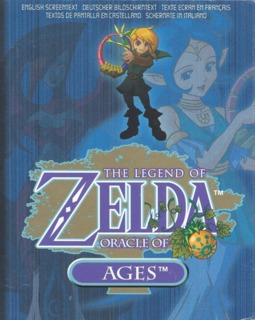A bright new concept that could have been more used
Capcom with its many incredible franchises is a company respected among the gaming community but could a team formed by Capcom and Nintendo's employees succeed when handling the development of the epic series created by Miyamoto? The answer to that question is very obvious when one plays through adventure presented on any of the games, the developers were superb and managed to sneak the wonderful Zelda Universe into a handheld system without losing any of the characteristics that made the Zelda series so popular.
Oracle of Seasons starts when Link is called by the Triforce, he proceeds to reach the temple on which the sacred treasure is being kept. When he gets close to it he is automatically transported to a dark forest located on Holodrum where he comes across a traveling group whose leader is Din, the Oracle of Seasons. Once he approaches the group they are attacked by lighting and a Din is suddenly captured by Onox, General of Darkness.
As a consequence the four Seasons all over the land of Holodrum go completely crazy as winter, fall, summer and spring affect different areas of the map all at the same time. Link goes to meet the Maku Tree that tells him that in order to rescue Din he will need to find Eight Nature Essences scattered across the land. To do so Link must gain control over the Seasons by acquiring a magic wand that allows him to change them at will. Unfortunately when compared to other Zelda games the storyline isn't as good as we are all used to.
Both games are impressive graphically but Seasons is the best one in this category due to the amazing colors used on each one of the seasons. The white snow makes everything lighter when winter arrives, on autumn the colors get slightly darker and so the pallet changes every time you use your wand. The character models and constructions are also pretty impressive.
The colors are not the only things that change as you switch the Seasons, the scenario also suffers several alterations. On winter lakes are frozen, on summer they all dry up, on spring flowers bloom all over the place and on autumn leaves cover the ground, the changes go on and on therefore they are way too many to be listed here. Using the aspects of each Season will be necessary to solve environmental puzzles and advance.
The concept of different Seasons is extremely creative and new to the series but unfortunately it isn't as much used as time travelling is on Ages. During the latter you will be always switching between past and present but on Seasons you won't have to navigate through the different seasons so much. Changing from one to another just becomes usual once the game gets close to its ending thereby I feel like this could have been much more used.
The eight dungeons in the game are quite nice but they don't present as many puzzles as those of Ages. These dungeons are more based around combat and exploration but they will eventually throw a couple of brain teasing challenges at you. In the end Seasons feels like a much more action oriented game. The bosses and mini bosses also stand out because some battles are just way too exciting and make good use of the items acquired on the dungeons some of which are brand new like the magnetic gloves. The highlights of the dungeons are probably the side-scrolling sections that add some platforming to the game.
The replay value is elevated because there are two ways to finish this game. You can either play it regularly or use a password acquired once you finish the other title of the duo so that it plays like a sequel. In this "sequel" you will have new NPCs and some character you met on the previous game will remember your name. You will also receive passwords from NPCs that can be used in Ages to get a few prizes.
Overall Seasons, just like Ages, is as good as a Zelda game can be. It may have some flaws since it doesn't make use of the game's central concept as efficiently as Ages, nevertheless all the Seasons make nice changes on the environment and make the game's scenarios even more breathtaking. Oracle of Seasons is an action focused Zelda game that is filled with the same soul that can be found on every title that has been released for the series up to now.
Actual Score: 9.3

